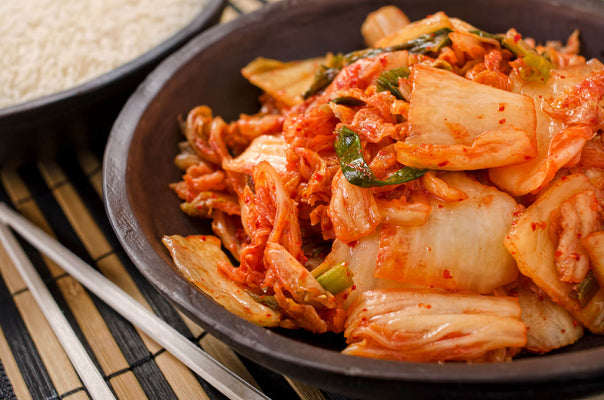Kimchi is a popular Korean side dish made from fermented and salty vegetables such as napa cabbage and Korean radish. To prepare kimchi, you need to keep it in airtight containers as it will facilitate lactic acid fermentation.
Understanding Halal Food
Halal is an Arabic term that means “permissible” in English. The words halal and haram are contrasted throughout the Quran. When it comes to food, Halal food is food that complies with Islamic law as outlined in the Quran. You can even calculate the halal index for the food of your interest.
The Quran provides great detailed information about whether a meal or a certain deed is halal or haram, just as it has clear guiding principles for other areas of human existence.
Muslims everywhere look up to the Quran and Sunnah for directions on how to live their lives following Islamic principles. These two sources of instruction include timeless ideas that contemporary Muslims can adhere to without a doubt.
Similar to its obvious guiding principles for all aspects of human existence, the Quran contains explicit injunctions on whether a given meal or action is halal or haram.
According to a verse of the Holy Quran, eating carrion, which includes dead meat, blood, and pig meat, is forbidden. In addition, it is haram to sacrifice a halal animal to a deity other than Allah. Therefore, Muslims are prohibited from consuming alcohol, insects, and other haram creatures.

Fermentation and Kimchi – Relevance to Halal Food
Fermented foods have been around for centuries. When refrigerators did not exist, it was fermentation that helped products last longer. Fermentation is the simple process of transforming plant or animal food sources further into a type of consumable food. Lactobacillus bacteria, which are found in carbohydrates, is a bacteria that helps in fermentation.
Lacto-fermentation refers to the process of fermenting food using lactobacillus bacteria.
Fermented foods provide several health advantages. They improve digestion because fermentation breaks down the food and smoothes the digestive process. They improve nutrient absorption, and fermentation improves the flavour of otherwise unpleasant food.
Apart from that, fermented foods include millions of bacteria that are very beneficial to the body, particularly the digestive system. They are often referred to as beneficial gut bacteria.
Understanding the background of kimchi requires looking at the lactic acid bacteria participating in the fermentation of kimchi and the features of the fermentation process based on the lactic acid bacteria strains. During fermentation, lactic acid bacteria develop numerous metabolites in reaction to the type of materials and storage temperature, and the metabolites affect the flavour and quality of kimchi.
At this point, we may address a key question of whether fermented food is even Halal. We must note that fermentation is a natural process, and thus fermented foods are highly nutritious and beneficial to the body.
However, one of its byproducts of fermentation is alcohol, which is unauthorized in Islam.
But, we shall note that the ethanol generated by the fermentation process is insufficient to make the food forbidden in Islam or labelled as non-halal. Examples include yoghurt and pickles, which, although fermented, produce only trace quantities of ethanol and are so acceptable in Islam and do not result in Haram.
Kimchi From The Lens Of Halal – Is It Even Possible?
Kimchi is a Muslim-friendly meal. Traditional kimchi has a little alcohol. As stated above, as kimchi ferments, ethanol may be produced as a byproduct. However, the presence of alcohol in kimchi is only in trace amounts, and most of such alcohol evaporates or gets fermented to vinegar.
Kimchi has recently gained popularity, raising questions about whether it is halal or not and why so. Find answers to all frequently asked questions.
In general, Islam state that all foods are permitted (halal), and nothing is forbidden (haram) unless there is confirmation in the Quran or sunnah that it is haram and should not be eaten.
Pork is one such example. At the same time, alcohol and other intoxicants such as narcotics are considered Haram under Islamic law.
Returning to kimchi, there is no solid proof in the Quran or any hadith that it is haram. Hence it is regarded as Halal. Since there is no reference to kimchi being haram in the Quran or any other Hadith, the alcohol concentration in kimchi is insufficient to intoxicate a person.
Therefore, we may include that kimchi is Halal for Muslims, and Muslims may eat kimchi without worrying if it is Halal or Haram.
Can Kimchi Become Haram?
Upon fermenting the cabbage for an extended period, it becomes sour. This suggests the presence of a significant quantity of alcohol, making it haram. If you feel that the kimchi has become sour, it is preferable to discard it at this stage and start again.
In addition, any haram food additives or other haram substances would render the Kimchi haram.
Getting The Right Kimchi
If you are a Muslim who is concerned about eating Halal food only and wish to enjoy good kimchi –. Here, you can find good quality halal kimchi to ensure that your consumption of the kimchi does not make you a Haram Muslim. Always make sure to buy products that are labelled as Halal.
This will ensure that you do not need to worry about the food item being halal. Upon buying through Chewwies, you will know that you're always making the right decision regarding what you are eating and, more particularly, eating fresh kimchi that is Haram-free, i.e., Halal.
Conclusion
Kimchi is prepared with several vegetables including carrot, radish etc. however, the most important ingredient of this dish is napa cabbage. We hope we have answered your question about whether kimchi is Halal. After doing some research, we have concluded that yes, it is completely halal.
Since the alcohol content in kimchi is acceptable – it reasonably passes the permissibility test of being Halal. Therefore, another key conclusion is that foods with a little amount of alcohol are permissible in Islam and thus considered halal.


